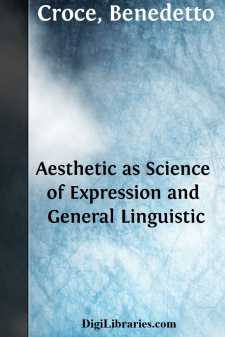Categories
- Antiques & Collectibles 13
- Architecture 36
- Art 48
- Bibles 22
- Biography & Autobiography 813
- Body, Mind & Spirit 142
- Business & Economics 28
- Children's Books 14
- Children's Fiction 11
- Computers 4
- Cooking 94
- Crafts & Hobbies 4
- Drama 346
- Education 46
- Family & Relationships 57
- Fiction 11828
- Games 19
- Gardening 17
- Health & Fitness 34
- History 1377
- House & Home 1
- Humor 147
- Juvenile Fiction 1873
- Juvenile Nonfiction 202
- Language Arts & Disciplines 88
- Law 16
- Literary Collections 686
- Literary Criticism 179
- Mathematics 13
- Medical 41
- Music 40
- Nature 179
- Non-Classifiable 1768
- Performing Arts 7
- Periodicals 1453
- Philosophy 64
- Photography 2
- Poetry 896
- Political Science 203
- Psychology 42
- Reference 154
- Religion 513
- Science 126
- Self-Help 84
- Social Science 81
- Sports & Recreation 34
- Study Aids 3
- Technology & Engineering 59
- Transportation 23
- Travel 463
- True Crime 29
Aesthetic as Science of Expression and General Linguistic
by: Benedetto Croce
Description:
Excerpt
INTRODUCTION
There are always Americas to be discovered: the most interesting in
Europe.
I can lay no claim to having discovered an America, but I do claim to have discovered a Columbus. His name is Benedetto Croce, and he dwells on the shores of the Mediterranean, at Naples, city of the antique Parthenope.
Croce's America cannot be expressed in geographical terms. It is more important than any space of mountain and river, of forest and dale. It belongs to the kingdom of the spirit, and has many provinces. That province which most interests me, I have striven in the following pages to annex to the possessions of the Anglo-Saxon race; an act which cannot be blamed as predatory, since it may be said of philosophy more truly than of love, that "to divide is not to take away."
The Historical Summary will show how many a brave adventurer has navigated the perilous seas of speculation upon Art, how Aristotle's marvellous insight gave him glimpses of its beauty, how Plato threw away its golden fruit, how Baumgarten sounded the depth of its waters, Kant sailed along its coast without landing, and Vico hoisted the Italian flag upon its shore.
But Benedetto Croce has been the first thoroughly to explore it, cutting his way inland through the tangled undergrowth of imperfect thought. He has measured its length and breadth, marked out and described its spiritual features with minute accuracy. The country thus won to philosophy will always bear his name, Estetica di Croce, a new America.
It was at Naples, in the winter of 1907, that I first saw the Philosopher of Aesthetic. Benedetto Croce, although born in the Abruzzi, Province of Aquila (1866), is essentially a Neapolitan, and rarely remains long absent from the city, on the shore of that magical sea, where once Ulysses sailed, and where sometimes yet (near Amalfi) we may hear the Syrens sing their song. But more wonderful than the song of any Syren seems to me the Theory of Aesthetic as the Science of Expression, and that is why I have overcome the obstacles that stood between me and the giving of this theory, which in my belief is the truth, to the English-speaking world.
No one could have been further removed than myself, as I turned over at Naples the pages of La Critica, from any idea that I was nearing the solution of the problem of Art. All my youth it had haunted me. As an undergraduate at Oxford I had caught the exquisite cadence of Walter Pater's speech, as it came from his very lips, or rose like the perfume of some exotic flower from the ribbed pages of the Renaissance.
Seeming to solve the riddle of the Sphinx, he solved it not—only delighted with pure pleasure of poetry and of subtle thought as he led one along the pathways of his Enchanted Garden, where I shall always love to tread.
Oscar Wilde, too, I had often heard at his best, the most brilliant talker of our time, his wit flashing in the spring sunlight of Oxford luncheon-parties as now in his beautiful writings, like the jewelled rapier of Mercutio....


